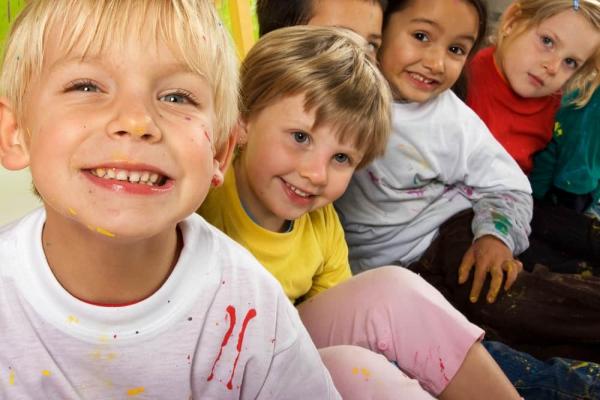
Summer will be coming to a close and soon children will be outfitted with backpacks and squeaky new shoes. Parents of soon-to-be Kindergarteners anxiously wonder if their child is emotionally outfitted to handle a new classroom. For some of these children, this will be their first time in a school setting. Here is a kindergarten checklist to assess their preparedness:
"Is my child old enough to be enrolled in kindergarten?" Check.
"Does my child know his ABC's?" Check.
"Can my child write her name?" Check.
"Does my child self-regulate his emotions, play well with others and follow rules and routines?" Hmmm. Not really.
As a professor, former kindergarten teacher and a mother of five children, I've seen dramatic changes in early childhood education in the past 30 years. Kindergarten classrooms of today are more similar to first grades of the past. No more milk, cookies and nap times. The emphasis is on academics, regardless of the child's age or emotional readiness. Research clearly shows a connection between emotional maturity and academic success. To address the social and emotional preparation and readiness, parents can do the following:
1. Minimize rewards for good behavior
Foster the intrinsic and lasting reward of self-confidence and positive peer relationships. Here are some phrases related to this behavior:
"Thank you for cleaning up your toys so quickly. Now we'll have more time for the two of us to read your favorite book together."
"You worked very hard on setting the table correctly. I was so impressed how you caught your mistake and changed the forks to the other side of the plate. Look at the finished table setting. How does it make you feel inside to know you did that all by yourself?"
"I saw today that you pushed Angelo on the swing when he couldn't pump himself. That was a nice way to help him out and take turns. I'm sure he likes having you for a friend because you think of others."
2. Use "Induction" techniques
These allow pre-kindergarteners opportunities to gain an understanding of the likelihood of how their actions may affect themselves and others. Here are some examples:
"If you let Hannah use your crayons, she'll probably let you use her markers. Then you can both have different kinds of writing utensils."
"When you throw your toys, they might get broken or stepped on."
"If you don't hang up your backpack each day, you will probably forget where it is and have to go to school without it."
3. Help identify and process emotions in a healthy manner
. When a child exhibits a strong emotion, it is best to not judge, undermine, devaluate or belittle him. Such negative phrases include:
"Stop acting like a baby."
"No, you don't hate your friend! She's a nice girl."
"You drive me crazy with your tantrums."
A pre-kindergarten child has difficulty understanding and putting labels on feelings and therefore, can feel out of control. He doesn't know what he is feeling or how to deal with it.
Parents can help by allowing the child to express his emotion in a safe situation, label the emotion ("Oh, you are cranky because you are so tired") and let the child know you will be ready to talk when he calms down. I like to say, "When your voice is calm like mine, then we can talk." Gaining emotional readiness is a key component for kindergarten maturation.
4. Build empathy
This can be done through serving others so the child gains an awareness of others in a stage of life that is naturally self-centered. Look for ways to help a neighbor or serve in a community organization and ask, "How does it make you feel to help?" When another sibling or friend is having a difficult time, use that as a teaching moment with your child. Talk about the situation, why that child feels that way, does your child ever feel that way too, how could we help and what would your child do if he were in that situation?
5. Structure rules, expectations and consequences
Be assured that in a quality kindergarten classroom, your child will experience all of these. "I don't want to," is not an acceptable excuse and dawdling can be devastating when she misses out on the fun. If you don't have a regular, consistent schedule of daily activities at home, your child will have more difficulty adjusting to them at school. Here are some items that should be established and addressed at home:
Daily chores
Even a small child can be expected to clear her plate from the table, pick up her toys, dress herself, feed a pet and make other family and household contributions.
Consistent schedule
Follow a schedule as much as possible. Consistency is reassuring and motivating for young children. Follow an early morning (post a picture chart to follow) as well as a bedtime routine. Give support and encouragement as your child completes these activities. Do as much as you can together to model it correctly. Use these as teaching moments for life skills. Allow privileges (reading a book together, going on an outing or playing with friends) after she is done.
Expect age appropriate behavior
Parents often demand too much or too little from their young children, not knowing where the right balance lies. Of course each child develops at a different rate of maturity, but there are general developmental competencies to achieve before children can function independently in kindergarten. Can he be left with another adult without major separation anxiety? Can he care for his own bathroom needs? (Really! I had a student who was never taught this.) The child should know that whining, tantruming and aggressiveness is not acceptable and will not garner attention or rewards.
Kindergarten readiness depends on social and emotional maturity. If children can self-regulate behaviors, follow the structure and schedule of a school environment and get along with others, then academic learning can more easily follow. Check!

